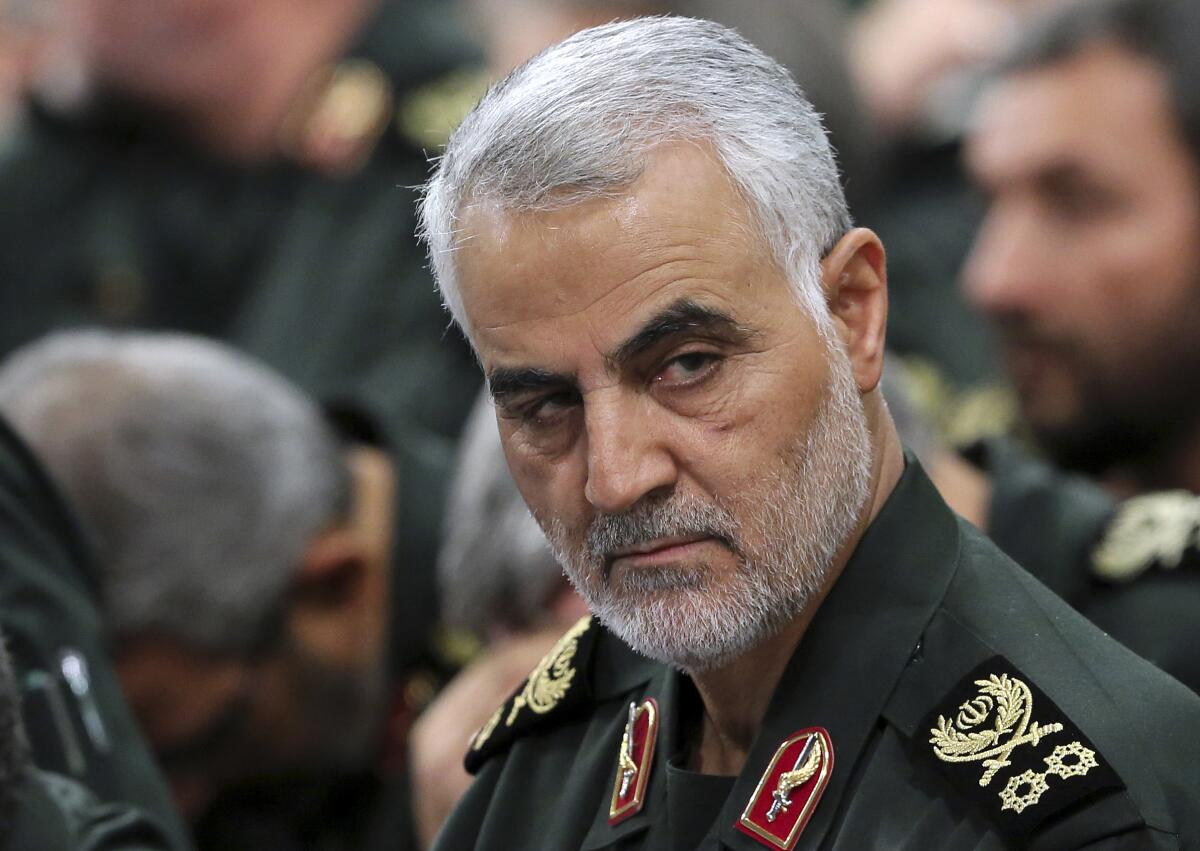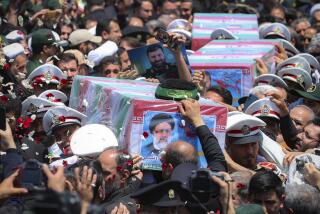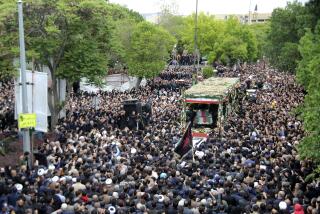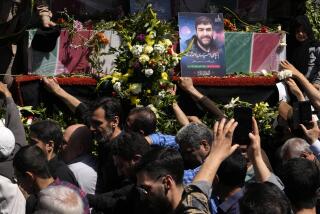Thousands in Baghdad mourn Iranian general killed by U.S.

- Share via
BAGHDAD — Thousands of mourners gathered Saturday for a funeral procession through Baghdad for Iran’s top general and Iraqi militant leaders killed in a U.S. airstrike that has caused regional tensions to soar.
Gen. Qassem Suleimani, the head of Iran’s elite Quds force and mastermind of its regional security strategy, was killed in an airstrike early Friday near the Iraqi capital’s international airport.
Iran has vowed harsh retaliation, raising fears of an all-out war. U.S. President Trump says he ordered the strike to prevent a conflict. His administration says Suleimani was plotting a series of attacks that endangered American troops and officials, without providing evidence.
Suleimani was the architect of Iran’s regional policy of mobilizing militias across Iraq, Syria and Lebanon, including in the war against the Islamic State group. He was also blamed for attacks on U.S. troops and American allies since the 2003 invasion of Iraq.
Many of the mourners were dressed in black, and they carried Iraqi flags and the flags of Iran-backed militias that are fiercely loyal to Suleimani. They were also mourning Abu Mahdi al-Muhandis, a senior Iraqi militia commander who was killed in the same airstrike.
The procession began at the Imam Kadhim shrine in Baghdad, one of the most revered sites in Shiite Islam. Mourners marched in the streets alongside militia vehicles in a solemn procession.
As tensions soared across the region, there were reports overnight of an airstrike on a convoy of Iran-backed militiamen north of Baghdad. Hours later, the Iraqi army denied any airstrike had taken place. The U.S.-led coalition also denied carrying out any airstrike.
The Popular Mobilization Forces, an umbrella group of mostly Iran-backed militias, and security officials had reported the airstrike in Taji, north of the capital. An Iraqi security official had said five people were killed and two vehicles were destroyed.
It was not immediately clear if another type of explosion had occurred.
Iraq, which is closely allied with both Washington and Tehran, condemned the airstrike that killed Suleimani and called it an attack on its national sovereignty. Parliament is to meet for an emergency session Sunday, and the government has come under mounting pressure to expel the 5,200 U.S. troops based in the country, who are there to help prevent a resurgence of the Islamic State group.
The U.S. has ordered all citizens to leave Iraq and closed its embassy in Baghdad, where Iran-backed militiamen and their supporters staged two days of violent protests this week in which they breached the compound.
No one was hurt in the protests, which came in response to U.S. airstrikes that killed 25 Iran-backed militiamen in Iraq and Syria. The U.S. said the strikes were in response to a rocket attack that killed a U.S. contractor in northern Iraq, which Washington blamed on the militias.
The killing of Suleimani comes after months of rising tensions between the U.S. and Iran stemming from Trump’s decision to withdraw from the 2015 nuclear deal and restore crippling sanctions.
The administration’s “maximum pressure” campaign has led Iran to openly abandon commitments under the deal. The U.S. has also blamed Iran for a wave of increasingly provocative attacks in the region, including the sabotage of oil tankers in the Persian Gulf and an attack on Saudi Arabia’s oil infrastructure in September that temporarily halved its production.
Iran denied involvement in those attacks but admitted to shooting down a U.S. surveillance drone in June that it said had strayed into its airspace.
More to Read
Sign up for Essential California
The most important California stories and recommendations in your inbox every morning.
You may occasionally receive promotional content from the Los Angeles Times.










